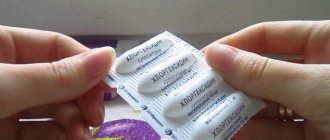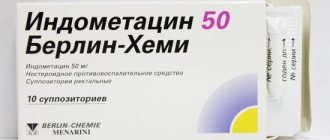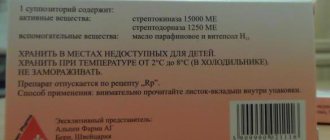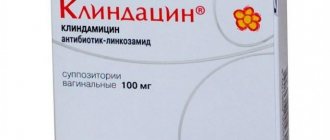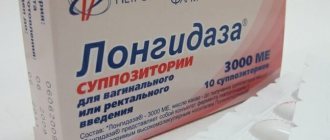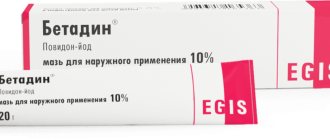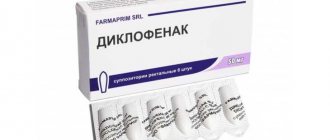Release form, composition and packaging
Depanthol is available in the form of vaginal suppositories. These candles are white, gray-white or yellow-white in color. The shape of the suppositories is oblong, one end is slightly pointed, the other is slightly concave. This form provides the most comfortable administration of the drug.
Each suppository contains 100 mg of dexpanthenol and 16 mg of chlorhexidine. Macrogols weighing approximately 3 grams are used as auxiliary components.
Each box of Depantol contains two blisters of 5 suppositories.
pharmachologic effect
The medicinal effect of Depantol is due to the action of its constituent components.
Dexpanthenol.
By actively participating in metabolic processes in the epithelium, dexpanthenol promotes restoration, hydration and reduction of inflammation in damaged tissues. In addition, panthenol stimulates cell division and restores the collagen framework of the skin and mucous membranes.
Chlorhexidine
– a substance that is effective against many pathogenic bacteria, including the causative agents of syphilis, gonorrhea, mycoplasma and chlamydial infections, as well as some protozoa (Trichomonas) and viruses (herpes). Chlorhexidine is effective even in the presence of pus, which makes it possible to use it in severe inflammatory processes.
Depantol has a double effect: it fights the causative agent of the disease and restores the damaged mucous membrane of the genital tract.
How to replace Depantol
A typical medication promotes tissue regeneration, but its effect in the body is selective. Not all patients are suitable for this pharmacological prescription, as evidenced by reviews on the World Wide Web. If this cheap drug is ineffective or causes side effects in the form of vaginal discharge, it is better to replace it with an analogue. The following treatments are especially effective in a given direction:
- Betadine;
- Citeal;
- That's right Keith;
- Hexicon;
- Gynoflor;
- Kolposeptin;
- Chlorhexidine;
- Osarbon;
- Furazolidone;
- Eucolec;
- Povidin;
- Ecovag;
- McMiror;
- Klioron;
- Betadine.
Pharmacodynamics and pharmacokinetics
The official instructions for the drug state that data on pharmacokinetics have not been obtained. This means that it is not possible to assess the path of Depanthol through the body.
Depanthol is a local medicine.
When used transvaginally, the components of the drug are not absorbed and distributed throughout the body. Therefore, the action of Depantol occurs only in the affected area.
This means that it is not correct to talk about the pharmacokinetics and pharmacodynamics of the drug.
When is the product used?
Experts say that the medication is an effective remedy in the fight against a wide range of diseases in the gynecological field. Suppositories are used if the following indications exist:
- processes of inflammation in the mucous membrane of the genital organs, characterized by a chronic or acute form of occurrence;
- erosion of the uterine cervix;
- endocervicitis and colpitis;
- mycosis.
In addition, the drug can be used as part of complex treatment measures for pathologies such as polyps of the uterine cervix or vagina. Relatively often, suppositories are used for the purpose of vaginal sanitation before childbirth. This is confirmed by the instructions for use and reviews of Depantol. Analogues will be presented at the end of the article.
It is also recommended to use the drug for preventive purposes, for example, before performing any gynecological procedures. These include: installation or removal of a spiral inside the uterus, the process of coagulation with electrical impulses of the uterine cervix, surgical abortion or other types of surgical intervention. It is recommended to use suppositories both before and after the procedures described above.
In addition, suppositories are used as part of complex therapy for certain diseases transmitted during intimacy.
Indications
Depantol can be used in the treatment of many diseases and pathological conditions, including the following:
- mechanical damage to the mucous membrane of the genital tract (traumatic childbirth, RDS, polypectomy of the cervical canal, complicated colposcopy);
- cervical erosion;
- acute and chronic vulvovaginitis of bacterial etiology;
- fungal diseases of the genital tract (thrush), as a component of complex treatment;
- kraurosis and leukoplakia of the vulva.
Contraindications
The only absolute contraindication to the use of Depantol is an allergy to depanthenol (and its active form - vitamin B5), chlorhexidine and macrogols.
A relative contraindication to the use of Depantol is the presence of malignant tumors of the external female genitalia, vagina and cervix.
The question of using the drug under the age of 18 remains open. A number of authors believe that in case of violation of the integrity of the hymen (hymen), the drug can be used regardless of age. But some guidelines note that the drug should not be used before reaching the age of eighteen.
Depantol suppositories can be used during menstruation. The drug does not affect the cycle, and menstrual flow does not reduce the concentration of active substances in the lesion.
Directions for use and dosage
Before using the suppository, the vulva should be toileted. It is better to administer suppositories in a lying position. Depantol suppositories are inserted into the vagina, pointing the sharp end forward, to a depth of 5–7 cm. After this, you should remain in a horizontal position for about half an hour (under the influence of body temperature, the suppository will melt and the semi-liquid mass may flow out). During menstruation, you should follow exactly the same algorithm of application.
The standard daily dosage of Depantol is two suppositories, morning and evening.
The duration of therapy may vary:
- after cauterization of cervical erosion, Depantol suppositories are used for 14–21 days;
- for the treatment of bacterial vaginitis and vulvovaginitis, a course of 7–10 days is sufficient;
- when treating thrush, the course of using Depantol lasts up to 20 days;
- in the postpartum period, Depantol is prescribed for 10–14 days.
Features of use
According to the instructions for use, it can be concluded that these suppositories are used exclusively for intravaginal use and only by those persons who have already reached the age of majority. To facilitate the insertion procedure, the woman needs to lie down. After deep insertion of the suppository, doctors recommend lying down for another forty minutes.
The medication should be used twice during the day, that is, in the morning and in the evening. Before starting the administration procedure, you need to thoroughly wash your hands and then treat them with a disinfectant solution.
On average, the duration of treatment with this drug is approximately two weeks.
If there is a need to extend the therapeutic course, you should consult your doctor about possible side effects. You can use Depantol suppositories during pregnancy for three weeks. If, after using suppositories for one week, the required result is absent and the patient’s well-being worsens, then it is necessary to contact a specialist to further confirm the diagnosis, or additional study of the problem, or prescribe similar drugs.
Side effects
Cases of the development of undesirable side reactions and complications during the use of Depantol are extremely rare. Below is a list of the most common ones:
- allergy to dexpanthenol or chlorhexidine, which is manifested by redness of the vulva, itching and burning in the vagina;
- spotting that occurs after using Depantol suppositories for the treatment of bacterial vulvovaginitis, erosions or inflammatory processes of the genital tract; these secretions are not directly related to the components of Depantol; This phenomenon should probably be considered a reaction of microorganisms to chlorhexidine;
- microtrauma of the vaginal mucosa; most often this complication occurs when Depantol suppositories are administered immediately before sexual intercourse; in this case, as a result of friction of the suppository, which has not yet lost its solid state, against the vaginal wall, microdamages may occur, which may also be accompanied by light bleeding.
In case of allergic reactions, the use of Depantol should be stopped, the genitals should be toileted and antihistamines should be taken. Treatment for bleeding does not require treatment.
During pregnancy
During pregnancy and lactation, doctors do not exclude such pharmacological prescription at home. The use of Depantol suppositories is appropriate for thrush that progresses against a background of weakened immunity for productive healing of the mucous membranes. The healing processes are not accompanied by a deterioration in general health; the active components of the suppositories are not excreted in breast milk and do not cross the placental barrier. Therefore, restrictions on use do not apply to these categories of patients.
- Antiphospholipid syndrome - what is it? Diagnosis, tests and clinical recommendations for ATP syndrome
- Lychee: how to eat the fruit correctly
- The thymus gland: where it is located and what it is responsible for
Analogs
There are not many products on the domestic market that are similar in therapeutic effect to Depanthol. The main analogues of the drug are:
- Bepanten.
Contains dexpanthenol as an active ingredient. It has healing and anti-inflammatory activity, but does not affect microorganisms. Bepanten should be used 1 suppository 2 times a day for 10 – 20 days. - Venro Kit.
This is a complex drug with antibacterial (due to azithromycin), antifungal (fluconazole) and antitrichomoniacal (secnidazole) activity. It is used only for the etiological treatment of vulvovaginitis, as it does not contain a healing component. Recommended dose: in the morning - 1 tablet of azithromycin, in the afternoon - 1 tablet of fluconazole, after dinner - 2 tablets of secnidazole. - Kolposeptin.
The drug is available in the form of vaginal tablets containing the antibacterial agent chlorquinaldol and the synthetic estrogen promestriene. Usually take 1 tablet 1 time per day (in the evening) for 2 to 3 weeks. - Suppositories containing chlorhexidine as an active ingredient. These suppositories may have the following trade names: Chlorhexidine, Hexicon, Hexicon D. The drug is administered 1 suppository 2 times a day for 10 to 18 days.
Reviews
The vast majority of women who have used Depantol leave positive reviews about this drug. Among the advantages, the patient notes the high effectiveness of the drug in the treatment of cervical erosion, vulvovaginitis and cervicitis.
Many women leave positive reviews about Depantol suppositories, noting the good effect of their use as part of complex therapy for thrush.
Among other advantages of Depantol, there are also a small number of contraindications and rare side effects.
The main disadvantage of Depantol suppositories, according to patients, is their not the lowest price.
Price for Depantol candles
Real reviews about vaginal suppositories are positive, however, when making the final choice of medicine, the price of the issue is also significant. Depantol can be bought at any pharmacy or ordered online. In the second case, it turns out a little cheaper, but you have to wait 2-3 days for the courier to deliver. If the choice fell on city pharmacies, you can purchase candles from the following places:
| Name of pharmacy in Moscow | Price, rubles |
| ZdravZone | 470 |
| Pharmacy IFC | 625 |
| EuroPharm | 600 |
| ElixirPharm | 630 |
| Samson Farm | 570 |
| Kremlin pharmacy | 560 |
| Pharmacy Dialogue | 650 |

